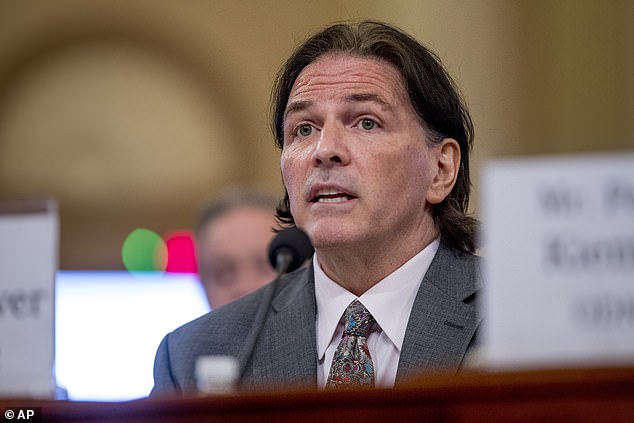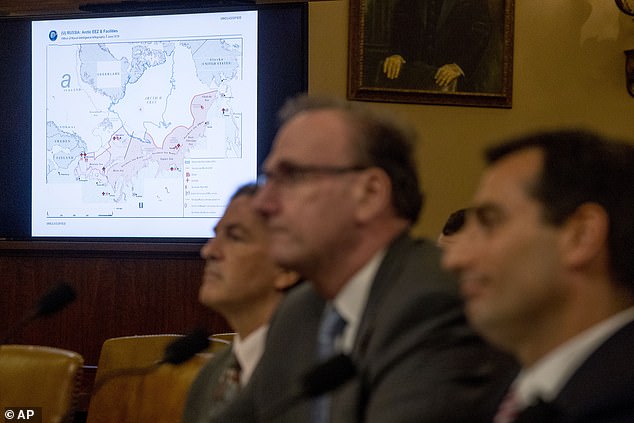White House 'blocked analyst's written testimony calling climate change possibly catastrophic, telling him it was alarmist propaganda'

- Analyst Rod Schoonover was blocked by the White House from submitting written testimony to House Intelligence Committee, new report says
- Schoonover did testify in person before the committee on Wednesday
- But administration officials said his written testimony was alarmist propaganda, a new report claims
The White House blocked an intelligence analyst's written testimony about climate change, saying it was alarmist and didn't 'jibe' with the Trump administration's position, according to a new report.
Analyst Rod Schoonover, who works in the Office of the Geographer and Global Issues, drew objections from officials from the White House's Office of Legislative Affairs, Office of Management and Budget, and National Security Council, according to the Washington Post.
Schoonover delivered verbal testimony before the House Intelligence Committee on Wednesday, but sources said his written testimony to the committee claiming that human-caused climate change is 'possibly catastrophic' was blocked.
The draft testimony, which Shoonover prepared on behalf of the State Department's Bureau of Intelligence and Research, drew a litany of critical notes from the National Security Council.

'This is not objective testimony at all,' read one comment, according to an individual familiar with the document.
'It includes lots of climate alarm propaganda that is not science at all. I am embarrassed to have this go out on behalf of the executive branch of the Federal Government.'
In another note, William Happer, a National Security Council senior director, objected to the phrase 'tipping point', the individual said.
'"Tipping points" is a propaganda slogan for the scientifically illiterate,' Happer wrote. 'They were a favorite of Al Gore's science adviser, James Hansen.'
Despite not delivering the written testimony, Schoonover did personally testify at the hearing.
'Climate change effects could undermine important international systems on which the U.S. is critically dependent, such as trade routes, food and energy supplies, the global economy, and domestic stability abroad,' Schoonover told members of the House Intelligence Committee.
'Most countries, if not all, are already unable to fully respond to the risks posed by climate-linked hazards under present conditions,' he said.

At the hearing, military and intelligence officials outlined a range of long-term threats arising from climate change, including food and water shortages that can produce political turmoil and land disputes, as well as melting ice in the Arctic that Russia and other adversaries could exploit for commercial gain.
The assessments laid bare the disconnect between senior officials who regard climate change as a long-term, global threat and the views of President Donald Trump, who has repeatedly broken from that message and even belittled his own government's views.
'I believe that there's a change in weather, and I think it changes both ways,' Trump told Piers Morgan in an interview on 'Good Morning Britain' that aired on Wednesday.
'Don't forget it used to be called global warming. That wasn't working. Then it was called climate change. Now it's actually called extreme weather, because with extreme weather, you can't miss.'
Peter Kiemel, counselor to the National Intelligence Council at the Office of the Director of National Intelligence, singled out the gradual thawing of the Arctic as a concern.
He said the melting of sea ice can create increased opportunities for mining, fishing and shipping for Russia by making the path between Asia and North America more navigable.
'As a result, the Arctic is emerging as a new domain of strategic competition,' Kiemel said. 'Russia, China and others are dramatically increasing their activities and investments in the region.'
Secretary of State Mike Pompeo made a similar point last month in a speech in Finland, but cast the warming sea as an economic opportunity for the West.
'Steady reductions in sea ice are opening new naval passageways and new opportunities for trade, potentially slashing the time it takes for ships to travel between Asia and the West by 20 days,' Pompeo said.
Jeff Ringhausen, senior naval intelligence manager for Russia and Eurasia at the Office of Naval Intelligence, was more cautious in his assessment Wednesday, but still conceded a potential threat to U.S. allies posed by a changing Arctic environment.
He said Russia was working to modernize infrastructure on its northern coast and on some of its Arctic islands, with the goal of establishing itself as an economic force. Though Moscow believes there's substantial economic potential in the Arctic, U.S. officials aren't so confident, Ringhausen said.
'Naval intelligence assesses that this economic potential exists, but that the Russian government appears overly optimistic regarding its development in the near and medium term,' he said.
He said that while Arctic shipping is likely to increase as a result of thawing, the region will probably account for only a small portion of overall global shipping.
The more direct threat is to U.S. allies in the Arctic rather than to the U.S. itself, he said.

By Keith Griffith For Dailymail.com and Associated Press
Published: 10 June 2019
Read more:







